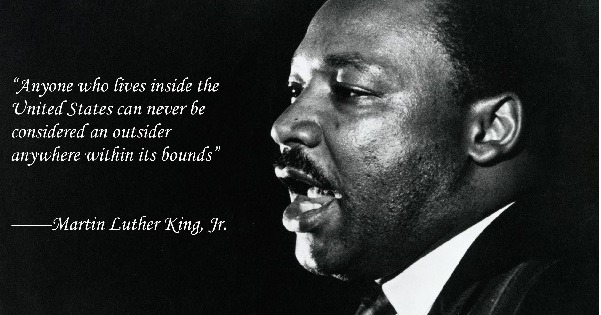Over 50 years ago Dr. Martin Luther King, Jr. challenged us to be conscious of the phenomenon of globalization and its role in the eradication of racial justice and economic equality, telling us that “all mankind is tied together; all life is interrelated, and we are all caught in an inescapable network of mutuality, tied in a single garment of destiny.” Although at the time Dr. King was specifically addressing world poverty and the adversities of war, at the core of his message is the idea that social and economic justice are not mutually exclusive, and that as the world becomes smaller the concept of equality transcends borders. As we honor Dr. King today, its important to recognize such sentiments, as we face a new wave of injustice that impedes progress in attaining social and economic equality; notably on the issue of immigration reform.
The issue of immigration reform in the United States is not new, yet a wave of illegal migration into the US in recent years has focused attention on a broken immigration system. There has been increased pressure on law makers to re-assess immigration policies that perpetuate income inequality, racial profiling, and exploitation of undocumented immigrants, as well as to establish comprehensive immigration reform focused on humane and just enforcement. Perhaps one of the biggest indicators of shifts in immigration policy is President Obama’s program of “deferred action” announced on November 20th, 2014 which would allow roughly 45% of illegal immigrants to legally stay and work in the United States. Although this program, and much of modern immigration reform, is heavily focused on Hispanic immigrants, the issue of immigration reform impacts a number of immigrant groups, including Eritreans.
The circumstances through which Eritreans migrate to the United States today is starkly different than those that migrated in the 70s and early 80s. A key distinction is a series of post 9-11 measures passed by Congress to tighten border security and broaden the government’s power to detain and deport immigrants. While the vast majority of earlier migrants arrived in the United States as refugees and received automatic standing of permanent residency, many Eritrean migrants today either enter illegally or extend their stay beyond the agreed upon terms of their temporary visitation. The illegal status of our less fortunate Eritrean brothers and sisters often make them vulnerable to the very economic and social injustices immigration reform advocates are trying to combat. Even those that are successful in attaining legal residency face challenges as they try and assimilate into their new environments. Both legal and illegal Eritrean residents may often find it difficult to secure employment, pay for housing, and access much needed health and social services.
Recognizing the direct impact that immigration policies have on our own community, it is imperative that Eritreans in the diaspora become aware of and engaged in immigration reform efforts, and support those who may be experiencing the brunt of the immigration process. If we are to sustain the well-being of our fellow Eritreans and continue to strengthen our community, immigration reform cannot be ignored. As you reflect on the many great works of Dr. Martin Luther King, Jr. today, remember his critical words “we may have all come on different ships but were in the same boat now.”


An excellent read! Keep up the good work.
i am an Eritrean.and my brother is in USA and he inter to USA ILLEGALY.bY USING A PASSPORT OF HIS BROTHER .SO WHAT I WANT IS THAT can the government of USA WILL ACCEPT MY BRO AS A LEGGAL PERSON.PLEASE GIVE ME A DETILED INFORMATION ABOUT THIS.